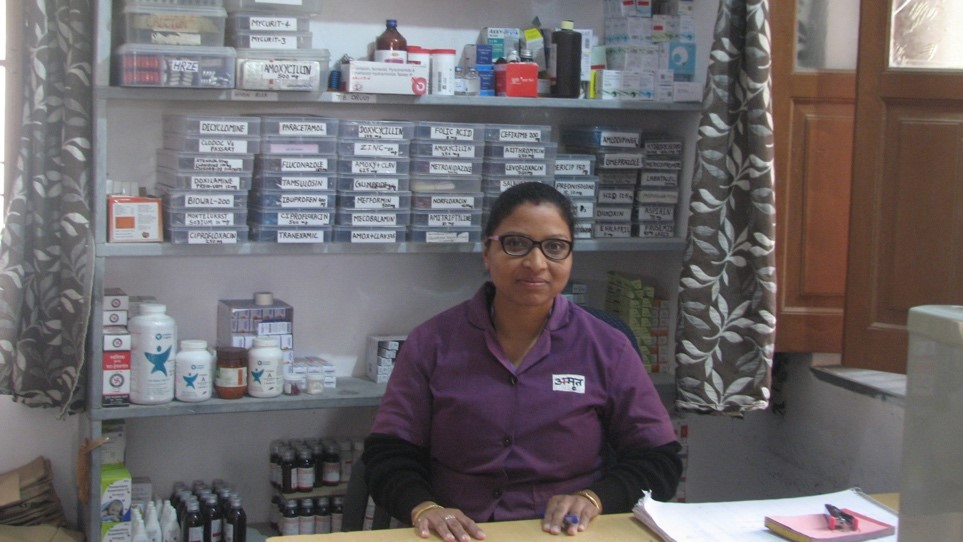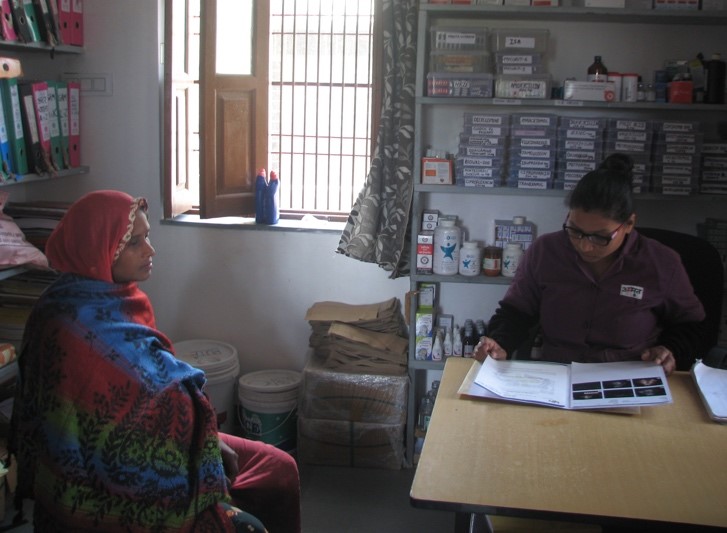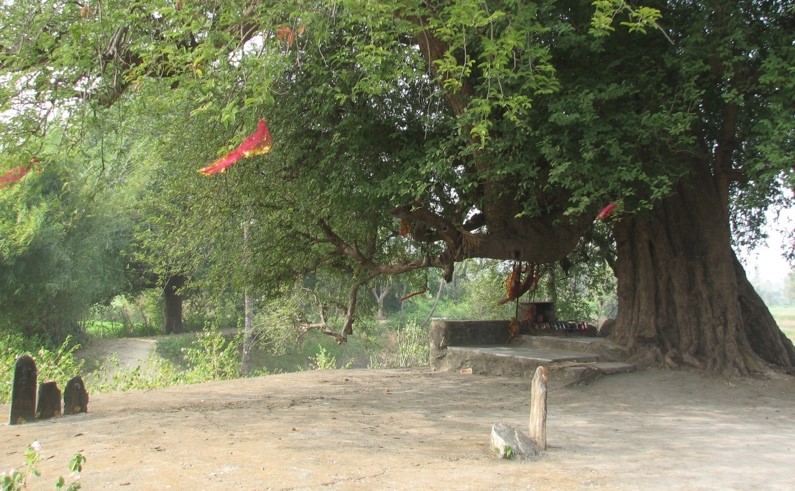The huge tamarind tree across the Ghated clinic immediately catches my eye as I get out of the car. The clinic is small and quiet. Even the village has the sleepy look of the later winter morning. A young boy, however, is hanging from the compound wall of the clinic, his toes barely touching the ground below. He frowns and bites into his lower lip, concentrating hard on the seemingly useless task of hanging. By the time we enter the gate and cross the small courtyard, the boy has pulled himself up by his thin, strong arms and is now sitting atop the wall, straddling it as if he were riding a horse. I couldn’t help but smile.
Soniya Nurse welcomed us to the spic and span clinic, with its gleaming white, tiled floors and every single thing in its place. As we entered, the hall had a registration desk in one corner, and a long desk against the opposite wall, with instruments and bottles lined a row. There were posters on the wall with the weekly field visits of health workers marked out in bright colours. The doctors’ room had a desktop computer where Soniya was working, busily typing in data that the main office required. A young mother, Soniya lives with three other nurses in the rooms adjacent to the clinic. Her small baby, she informs us with maternal pride, is doted upon by all of them. It is here that we spent time talking with a few breaks when a patient walked in.
and every single thing in its place. As we entered, the hall had a registration desk in one corner, and a long desk against the opposite wall, with instruments and bottles lined a row. There were posters on the wall with the weekly field visits of health workers marked out in bright colours. The doctors’ room had a desktop computer where Soniya was working, busily typing in data that the main office required. A young mother, Soniya lives with three other nurses in the rooms adjacent to the clinic. Her small baby, she informs us with maternal pride, is doted upon by all of them. It is here that we spent time talking with a few breaks when a patient walked in.
Perhaps the only regret in Soniya Modiya’s life is that she could hardly spend any time with her father, a police constable who was always away on duty. By the time he retired as the Thanedar of Dungarpur police station and returned to their village Ukhedi, she was already grown up. “The only time I lived with him was a couple of months at Varda where I was studying to become a GNM, otherwise my father used to come and go as a guest.”
It was her mother who brought up Soniya and her four siblings. She was the youngest and completed primary school in her village. In spite of all her chores, her mother would take her to the school some distance away and ensure that she studied. “My mother was afraid that someone would kidnap me if I walked alone to school and back,” she smiles, “and would accompany me on most days.”
After high school she successfully completed the GNM course from Sagwada. Disaster struck the family in 2019 when she was in her final year of GNM. Her mother was diagnosed with cervical cancer and she became extremely weak.
“My mother was so ill that she thought she would die and so she insisted that I should get married before her last breath – that was her only desire. She constantly wept saying that she wanted to see me settled before her death.” In order to comfort her mother, Soniya married at the age of 23 years to a man who was also a GNM. Soniya talks highly of her father-in-law who is a kindly man. “He was a community worker and very involved with social work. He treats me like a daughter. I feel happy that even though I could not spend much time with my father, I can serve my father-in-law.”
Soniya remembers how she used to be furious at the bad behaviour of some of the nurses in the government hospital where her mother was admitted. “They were unnecessarily harsh, as if the patient is responsible for the illness. I thought, what is so great about these nurses that they behave in such a rough manner! And I thought, I can do this work without such harshness.” The seed of her nursing career was thus planted deep by the personal experience of apathy and insensitivity in the public healthcare system.
After a brief stint in another private hospital, Soniya joined BHS in 2020 and was posted to the Amrit clinic, Rawach, but then she took a break and returned in 2022, this time in the clinic at Manpur. A year later she was sent to the Ghated clinic, where she works today as a Nurse Co-ordinator leading a team of four nurses. A young mother with an eleven month old baby, she lives on the premises and divides her time between her child and the clinic.
Soniya personifies efficiency starting her day at 9:30 a.m. and working most days till past 5:00 p.m. Ap art from this she is involved in training and mentoring junior nurses, data management and community outreach. On Doctor’s Day, she and her colleagues divide the workload – two nurses prepare the case sheet, one conducts lab tests and another works to dispense the medicines.
art from this she is involved in training and mentoring junior nurses, data management and community outreach. On Doctor’s Day, she and her colleagues divide the workload – two nurses prepare the case sheet, one conducts lab tests and another works to dispense the medicines.
According to Soniya, she has learned to overcome her fears through practice. She tells the story of the first delivery she conducted in Rawach in which the baby suffered birth asphyxia due to amniotic aspiration. “I was extremely nervous and in tears. Thankfully, Dr. Sanjana Madam was on the phone and guided us. We referred the baby to Udaipur and only when I learned on the third day that the baby was fine did I start to breathe normally again. Recently the mother brought the baby to the clinic – she was suffering with minor cough and cold. She said to me, this girl from your hands. I was so happy…”
There was period when the experience left Soniya diffident and she hesitated to come forward for conducting deliveries. Her seniors remained present in the labour room till slowly she regained her confidence. “Now I have got back my confidence. In fact, I like taking care of women and children – all gynae matters are my favourite. I can easily manage episiotomy, putting stitches … except for difficult pregnancies like breach presentation, I can handle most of the things.” Soniya’s smile is radiant.
There is a story about Soniya that a doctor at BHS narrates with great delight. This is about a session on Nurse leadership organized by Gender Collab, a platform that brings together partners to work towards advancing gender intentionality within the health systems. “It was wonderful to see her present what she sees as leadership, the importance of behaviour, of connecting with people. She spoke of how women share so much about their illness, because they are comforted by her (Soniya) and trust her. Soniya presented her views so confidently and clearly before a large audience,” recalls Sanjana. “On the one hand there were well known professionals from metropolitan cities as well as overseas and on the other there was our Soniya joining in from a small village, sitting with her head covered as most rural women do.”
On the afternoon that we met her, Soniya was busy with patients – mostly Adivasis who had travelled from the nearby villages. There were pregnant women who had come for regular check-ups, a couple of children with cough, cold and runny noses, and thin old men who wanted to collect their medical supplies.
At lunch time, Ashmita and I went across the road to the sacred grove. Underneath the overhanging canopy of the tamarind tree a trident and many stone gods were embedded. Nearby was a chabutra on which we enjoyed our packed lunch. All around us were verdant green wheat fields. Long-legged water birds with crimson throats took flight at a distance. It was a long time before we returned to the clinic. Soniya had just finished talking to the last patient of the day, an old woman whose grandson had an ear infection. As the grandmother left with her bag of medicines, Soniya smiled at us, “I think I will have lunch now,” she said.
overhanging canopy of the tamarind tree a trident and many stone gods were embedded. Nearby was a chabutra on which we enjoyed our packed lunch. All around us were verdant green wheat fields. Long-legged water birds with crimson throats took flight at a distance. It was a long time before we returned to the clinic. Soniya had just finished talking to the last patient of the day, an old woman whose grandson had an ear infection. As the grandmother left with her bag of medicines, Soniya smiled at us, “I think I will have lunch now,” she said.
Written by: Paromita Goswami
